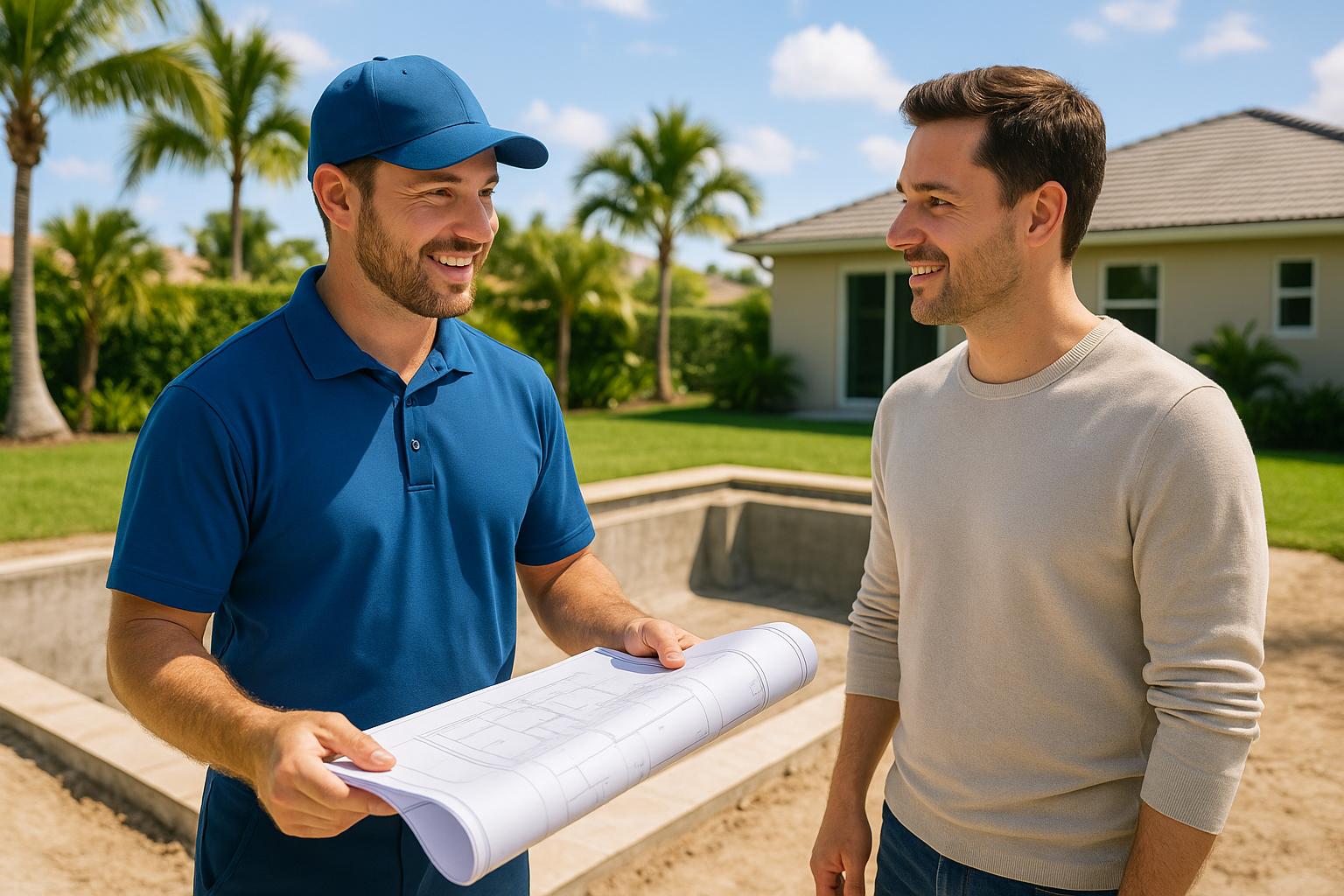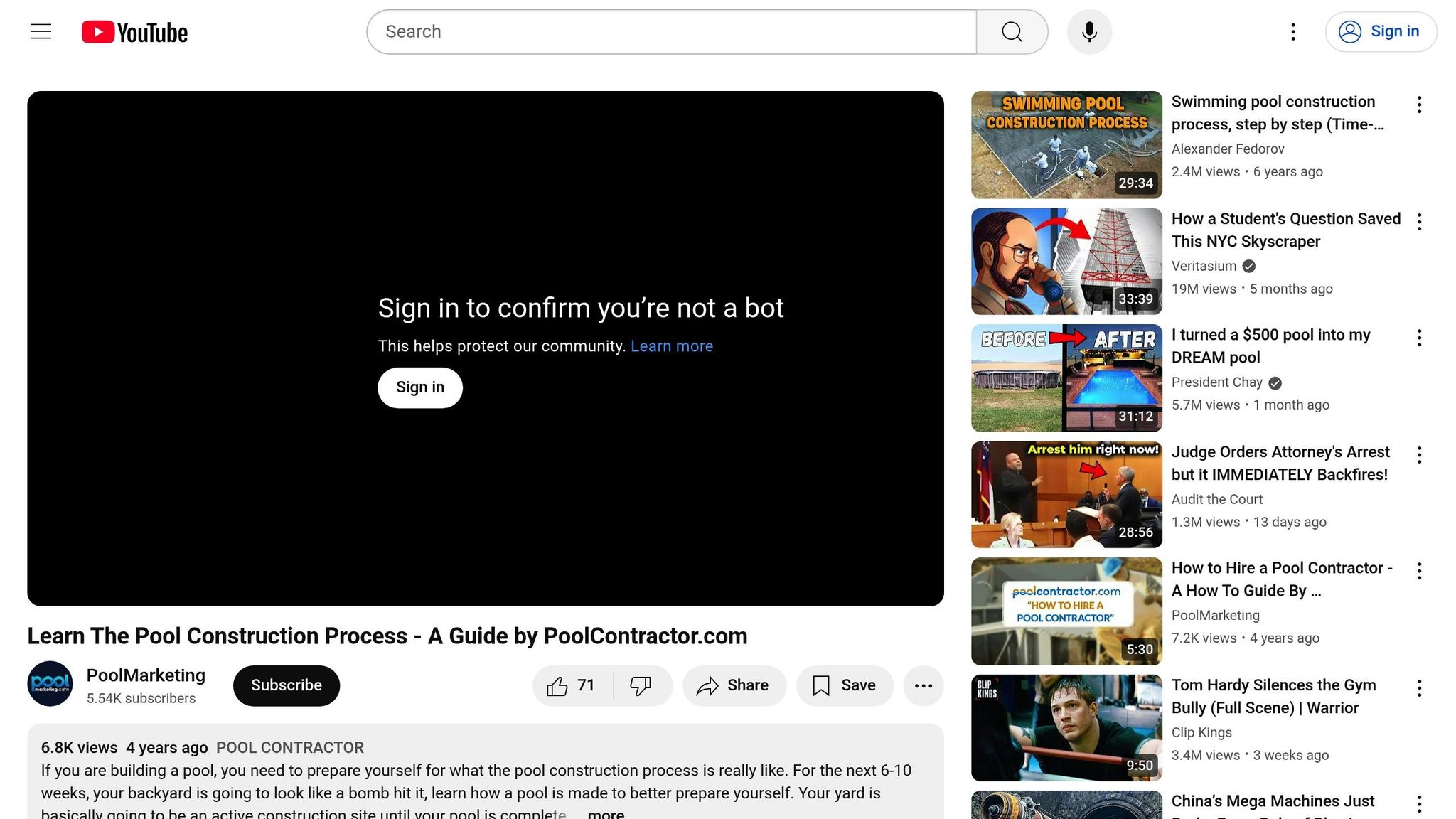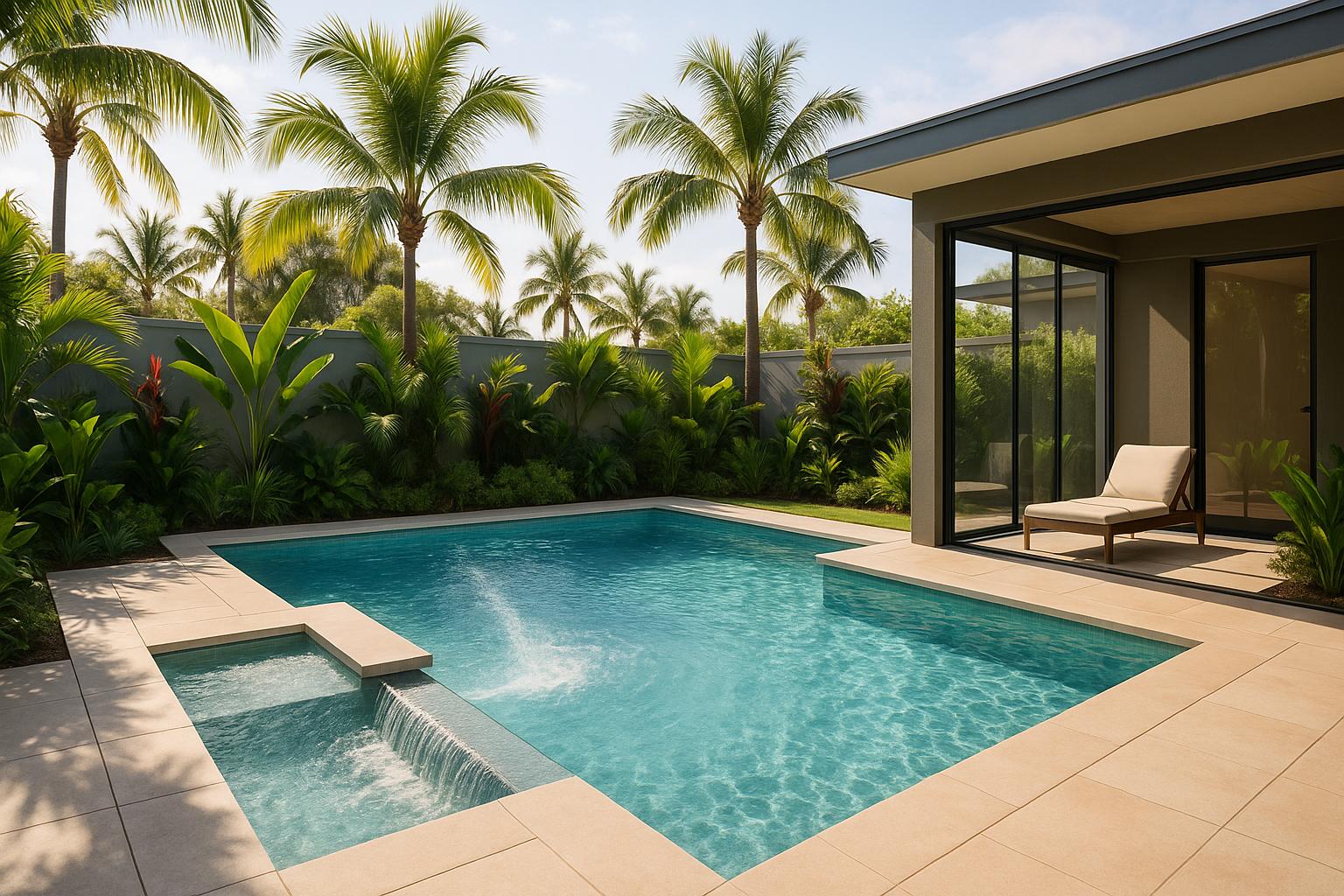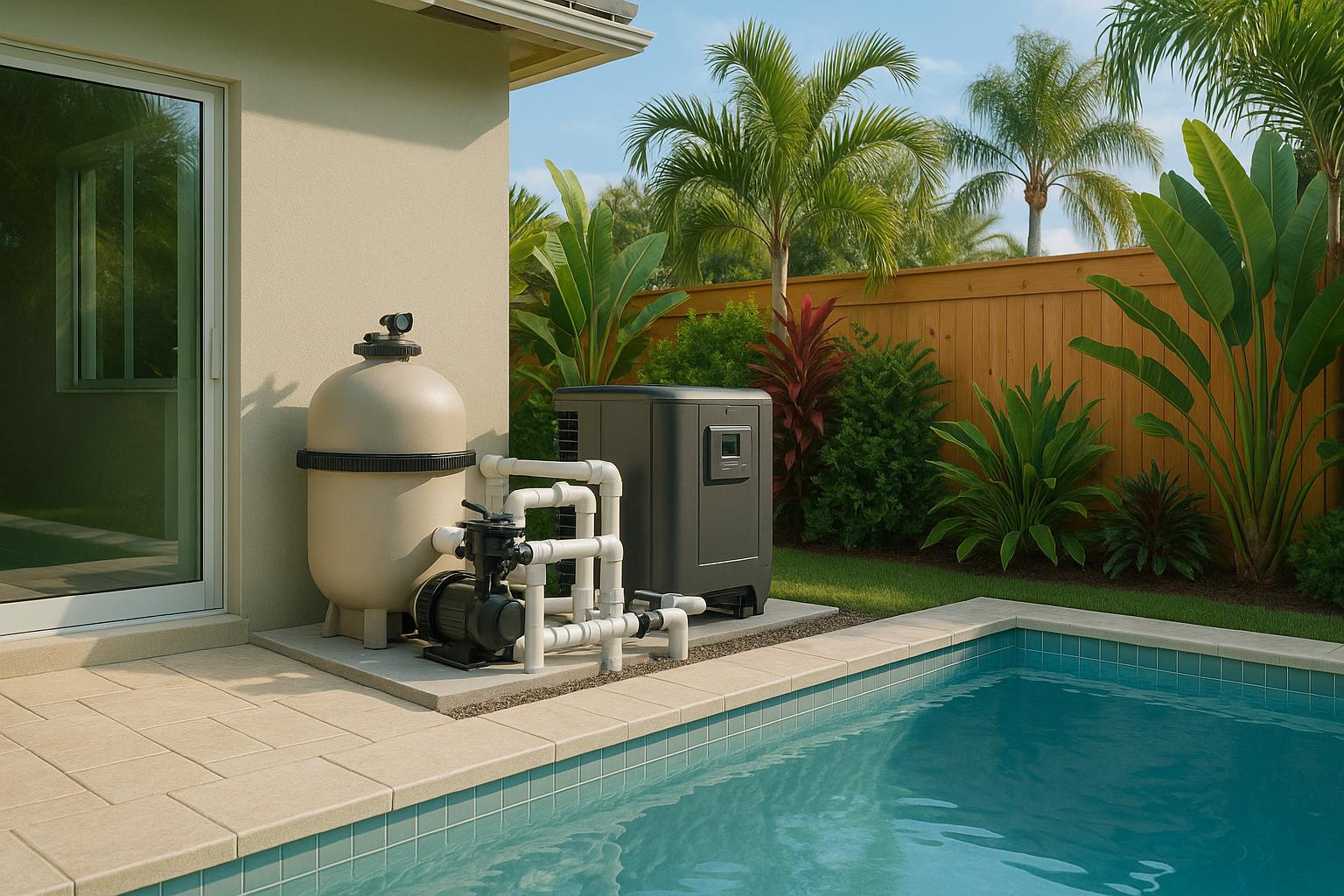10 Questions to Ask Pool Contractors Before Hiring

10 Questions to Ask Pool Contractors Before Hiring
Building a pool in Florida is a big investment, typically ranging from $30,000 to $100,000. To avoid costly mistakes, delays, or legal issues, it’s critical to hire the right contractor. Florida's unique conditions - like sandy soil, high water tables, and strict building codes - demand local expertise. Asking the right questions upfront can help you identify qualified professionals while protecting your investment.
Here’s what you need to ask:
-
Are You Licensed and Insured in Florida?
Verify their license on MyFloridaLicense.com and ensure they carry proper insurance, including General Liability and Workers’ Compensation. -
How Much Florida Pool Experience Do You Have?
Local experience is key. Ask about their familiarity with Florida’s challenges, like hurricanes, sandy soil, and water tables. -
Can You Provide References from Recent Florida Clients?
Request at least five references and ask about timelines, communication, and post-project support. -
What Is the Timeline for My Project?
Pool construction can take 6–10 months, including permits. Get a detailed, written timeline. -
What Is the Total Cost and Payment Schedule?
Ask for an itemized estimate and milestone-based payment plan. Avoid large upfront payments. -
What Warranties Do You Offer on Work and Materials?
Review structural and material warranties. Keep records to simplify claims. -
How Do You Handle Permits and Inspections?
Make sure the contractor handles all permits and inspections. Avoid anyone suggesting "permit-free" work. -
What Subcontractors Will Work on My Pool?
Verify that all subcontractors are licensed and insured. -
How Do You Communicate During the Project?
Establish a regular communication schedule and ensure you know your main point of contact. -
What Happens If There Are Problems or Disputes?
Confirm their process for resolving issues and ensure all agreements are documented in writing.
How to Hire a Pool Contractor - A How To Guide By PoolContractor.com

1. Are You Licensed and Insured in Florida?
Before hiring a pool contractor in Florida, it’s crucial to confirm that they are both licensed and insured. Contractors handling new pool construction or significant repairs must have a valid license issued by the Florida Department of Business & Professional Regulation (DBPR). To verify this, ask for their license number and check it on MyFloridaLicense.com. You can also use the DBPR Mobile app or call 487-1395 for verification.
When using the database, you can search by the contractor's first name, last name, city, or specific license number. The search results will include details like the contractor’s name, profession, address, and, most importantly, their license status. Make sure the status is either "Current, Active" or "Probation, Active" - these are the only statuses that legally allow them to work in Florida.
After confirming their license, check that their insurance aligns with your project’s needs. Contractors should carry General Liability and Workers’ Compensation insurance (or have a valid exemption). If your project involves work on or near water - such as an infinity pool or a waterfront installation - the contractor must also have USL&H insurance (United States Longshore and Harbor Workers' Compensation Act coverage). Always request written proof of their insurance coverage.
"THE OFFICIAL SITE OF THE FLORIDA DEPARTMENT OF BUSINESS & PROFESSIONAL REGULATION"
2. How Much Florida Pool Experience Do You Have?
Florida's climate and regulations bring unique challenges that require contractors who truly understand the state's demands. A contractor with plenty of Florida-specific experience knows how to build pools that can handle hurricane-force winds, adapt to sandy soil conditions, and comply with the Florida Building Code.
When considering a contractor, ask about their local project history. How many pools have they built in your area? Can they provide examples of pools that have survived major hurricanes? Experienced contractors should be able to explain how they reinforce structures to withstand strong winds and manage issues like Florida's high water table. Their track record will give you confidence in their ability to tackle the severe weather common in the state.
Building pools in Florida requires careful attention to structural reinforcement, proper drainage systems, and elevated equipment to protect against hurricanes and flooding. Additionally, Florida’s building codes include strict requirements for pool barriers, electrical systems, and setback distances, which can vary by city or county. Contractors with local expertise know how to navigate these regulations and permitting processes efficiently, helping you avoid unnecessary delays.
It’s also a good idea to ask for examples of projects that match your vision. For instance, if you're dreaming of a saltwater pool, have they installed similar systems in coastal Florida? For features like infinity pools or elaborate water designs, can they demonstrate how they’ve addressed Florida’s unique soil and drainage issues? Request photos of completed projects, and if possible, visit some of their recent installations to see the quality for yourself.
A contractor's knowledge of materials and methods suited to Florida's climate is another key factor. They should be familiar with pool finishes that can endure Florida's intense UV rays and equipment brands that resist the humid, salt-filled air. And when it comes to construction timelines, seasoned contractors know how to schedule critical tasks - like concrete pours - outside of Florida’s rainy season to keep the project on track.
3. Can You Provide References from Recent Florida Clients?
One of the best ways to assess a contractor’s reliability, communication, and work quality is by asking for references from recent clients in Florida. This step goes hand-in-hand with checking their licensing and experience, offering a well-rounded view of their performance.
Aim to get at least five references. Why? Because it gives you a broader perspective on how they handle projects of varying complexity. A single glowing review is great, but multiple references help you spot patterns in their work and professionalism.
When you connect with these references, dig a little deeper. Ask specific questions like:
- How did the contractor handle unexpected challenges?
- Were timelines and budgets adhered to?
- How was communication throughout the process?
Don’t forget to inquire about post-completion support. Did they address warranty issues promptly? Were they responsive to maintenance questions? This can give you an idea of their commitment to customer satisfaction even after the project is done.
If possible, ask to visit a completed pool project. Seeing the finished product in person allows you to evaluate the craftsmanship, attention to detail, and overall quality. Plus, many happy clients are proud to show off their pools, and it’s a great way to see if the contractor’s work aligns with your vision.
Be cautious if a contractor seems reluctant to provide multiple references. A trustworthy professional will have no problem sharing recent client contacts and showcasing their strong track record. These insights can give you the confidence you need to make an informed decision.
4. What Is the Timeline for My Project?
Understanding your project timeline is just as important as checking a contractor's licensing and experience. Pool construction timelines can vary widely - expect around 6–8 weeks for straightforward projects and up to 5–10 months for more intricate designs. A big factor to consider is the permitting phase, which in Florida can significantly impact your schedule.
Permitting timelines in Florida differ from county to county, often adding an extra 2–3 months to your project. It’s worth asking if the contractor will handle all permit applications and inspections for you.
Florida’s unpredictable weather can also affect your timeline. Rainstorms might delay excavation, and high humidity can slow the curing process for materials.
If your project includes custom features like waterfalls, intricate lighting, or an infinity edge, expect additional time. These elements often require specialized subcontractors and more detailed work.
To stay informed, ask for a written schedule that breaks down major phases such as excavation, rough-ins, structural work, finishes, and the final startup. This schedule should clarify which parts of the process depend on weather and which can move forward regardless of conditions.
Also, make sure to discuss how the contractor will communicate delays caused by weather, permitting issues, or material shortages.
Be cautious of contractors who promise unusually fast completion times. A trustworthy professional will acknowledge possible delays and provide contingency plans to keep your project on track.
5. What Is the Total Cost and Payment Schedule?
When planning pool construction in Florida, it’s crucial to get a detailed written estimate in US dollars that outlines every cost associated with the project. This estimate should include everything - from excavation to the final startup - to shield you from surprise expenses related to local permit fees or material upgrades. A clear breakdown of costs ensures you stay on track with your budget.
Your estimate should also account for potential extras that might come up during construction. For example, permit costs can vary significantly depending on your county, and upgrades like choosing a premium finish instead of the standard option should be clearly noted. Having these details upfront sets the foundation for a transparent, milestone-based payment schedule.
Payment Milestones and Itemized Costs
Make sure equipment costs are itemized separately, and payments are tied to project milestones rather than a fixed calendar. This approach gives you a clear picture of where your money is going and helps you prioritize features that matter most to you. For example, payments might align with key stages like excavation, completing the pool shell, installing decking and equipment, and the final startup and cleanup.
Avoid Large Upfront Payments
Florida law places limits on deposit amounts, so avoid contractors asking for large payments upfront. Payments should correspond to completed milestones. For instance, you should pay only after specific phases of the project are finished - not based on arbitrary dates. Also, never pay for materials before they’re delivered. Reputable contractors typically have supplier accounts and won’t need advance payment for materials.
Change Orders and Cleanup Costs
Ask about the contractor’s process for handling change orders. A reliable contractor will explain how they manage additional work or modifications and will require your written approval before proceeding with any extra charges. Additionally, ensure the estimate includes cleanup and disposal fees, such as the cost of removing debris from excavation, so there are no surprises later.
Finally, always get everything in writing. A detailed written contract is essential, as verbal agreements or handshake deals offer little protection if disputes arise.
sbb-itb-3649da6
6. What Warranties Do You Offer on Work and Materials?
When investing in a pool, warranties play a vital role in protecting your investment. They provide peace of mind by covering potential defects or issues without adding unexpected costs. Since different parts of your pool may have varying warranty terms, it’s essential to understand exactly what’s covered. Start by reviewing the specific warranty details for your pool's structure.
Structural Warranty Coverage
Structural warranties typically cover the pool shell and other major construction elements critical to its stability and longevity. The terms can differ widely, so it’s important to ask your contractor for clear details about what’s included in the pool shell and structural coverage.
Understanding the Claims Process
If you need to file a warranty claim, contact your contractor immediately. Ask them to explain how they coordinate with manufacturers and clarify how long it usually takes to resolve claims.
To make the process smoother, keep detailed records. Maintain a digital folder or binder with all your maintenance logs, service receipts, serial numbers, and warranty documents. These records can be invaluable when filing a claim and may save you time and frustration.
Florida's New Construction Warranty Law
Beginning July 1, 2025, a new law in Florida will require builders to fix construction defects at their own expense. If they fail to do so, homeowners will have the right to pursue civil action. This legal safeguard adds an extra layer of protection for new constructions in the state.
Key Warranty Questions to Ask
When discussing warranties with your contractor, consider asking the following:
- Does the warranty require product registration to activate? If so, find out whether your contractor handles this step or if you’ll need to do it yourself. Keep in mind that skipping registration could void your coverage.
- How long does it typically take to resolve warranty claims? Understanding their process and whether they have a dedicated team for warranty issues can help set your expectations.
Comparing Warranty Terms
When evaluating warranties, look at both their duration and scope. Confirm whether the coverage includes both parts and labor. Additionally, note that Florida law provides a four-year window for filing warranty claims. It’s also worth assessing the contractor’s track record in handling claims - reliability can make all the difference when issues arise.
7. How Do You Handle Permits and Inspections?
In Florida, licensed contractors are legally required to handle permits and coordinate inspections. This rule is in place to protect both homeowners and contractors. When discussing your project with potential contractors, confirm they fully understand this responsibility and have a reliable process for managing all permit-related tasks. It's also a good idea to familiarize yourself with Florida's specific permit requirements so you know what your contractor is responsible for.
Understanding Florida's Permit Requirements
Building a pool in Florida involves several permits and inspections, which can vary depending on the county. Contractors must be familiar with local requirements, including additional permits for related work like plumbing, electrical, or structural tasks.
Key inspections - such as those for excavation, steel placement, plumbing, electrical work, and the final review - must be completed and approved before moving forward. A seasoned contractor will schedule these inspections efficiently to avoid unnecessary delays. This attention to detail can help you spot red flags in a contractor's proposal.
Red Flags to Watch For
Be cautious of contractors who suggest skipping permits or doing "permit-free" work. This practice not only violates Florida law but can lead to expensive rebuilds and may void your insurance coverage.
Also, avoid contractors who ask you to pull permits yourself. Doing so shifts the legal responsibility onto you, which can lead to complications down the road.
Questions to Ask About Permits
Here are some key questions to ask your contractor:
- How long does it usually take to get permits approved and inspections completed?
- What happens if an inspection fails?
- Are permit fees included in the quoted price?
Some contractors bundle permit fees into their total cost, while others expect homeowners to pay these fees separately. Clarifying this upfront can prevent unexpected costs later.
Working with Local Building Departments
Experienced pool contractors in Florida often have established relationships with local building departments. This helps them navigate each jurisdiction's preferences and requirements smoothly. They’ll know which inspectors are more thorough, what common issues might cause a failed inspection, and how to prepare for each review to ensure a smoother process.
A reliable contractor should provide you with permit numbers and inspection schedules so you can monitor progress yourself. Many counties in Florida now offer online systems where you can track permits and view inspection results, including any required corrections, in real time.
Ensuring Compliance and Protection
Proper permitting is about more than just following the law - it ensures safety compliance and provides legal documentation that can be crucial for insurance, resale, or future renovations. Make sure your contractor has a clear plan for addressing inspection failures or corrections. Any required fixes should be handled promptly and at no additional cost, as part of the original agreement.
8. What Subcontractors Will Work on My Pool?
After confirming that your main contractor is licensed and insured, don’t overlook the subcontractors. Pool construction involves several specialized trades, like electricians, plumbers, and professionals skilled in specific aspects of pool building. It’s essential that each subcontractor working on your project is properly licensed and insured in Florida for their respective roles.
Ask your contractor for the names and license numbers of all subcontractors involved. Then, take the time to verify their credentials through the Florida Department of Business and Professional Regulation's website. This extra step ensures that every person contributing to your pool’s construction meets Florida’s safety and regulatory standards, giving you added peace of mind.
9. How Do You Communicate During the Project?
Building a pool is a lengthy process, often taking weeks or even months, so keeping the lines of communication open is crucial to avoid confusion and delays.
Start by understanding how your contractor prefers to communicate. Some rely on email to maintain a written record of all discussions, while others might opt for phone calls to provide quicker updates. Many contractors today use project management apps or send photo updates via text, giving you a clear view of daily progress.
It's a good idea to set up a regular communication schedule. A dependable contractor will typically provide updates on a weekly basis - or even daily during critical stages like excavation, plumbing, or concrete work.
Make sure you know who your primary contact person is. Whether it’s the owner, project manager, or foreman, this individual should be available during regular business hours and able to respond to your inquiries within 24 hours.
Be proactive about discussing how your contractor handles unexpected challenges or project changes. Issues like bad weather, tricky soil conditions, or permit delays can impact timelines. A professional contractor will notify you immediately, explain the situation clearly, and present options for how to proceed. They should never move forward with major decisions without your approval.
Always ask for written confirmation of any changes to the project or timeline. This ensures both you and the contractor are on the same page and protects you in case of disputes.
Lastly, inquire about progress documentation. Regular photo updates showing completed work can help you stay involved in the project, even if you're not able to be on-site every day. These updates provide peace of mind and keep you connected to the process.
10. What Happens If There Are Problems or Disputes?
Even with the best planning, pool construction projects can sometimes hit unexpected bumps in the road. That’s why it’s smart to ask upfront how the contractor handles problems and disputes. A clear plan for resolving issues can save you a lot of stress if things don’t go as planned.
Good communication is key during construction, and the same goes for resolving disputes. Start by asking the contractor about their process for handling problems. A professional contractor should have a detailed, step-by-step approach in place. Minor issues are often resolved through direct communication, but more serious disagreements might require mediation or arbitration.
Mediation involves a neutral party helping both sides come to an agreement, while arbitration uses an impartial decision-maker to provide a binding resolution. Make sure your contract spells out the steps to take if initial discussions don’t resolve the issue.
You should also ask about how warranty disputes are handled. If your pool develops any problems after it’s finished, you’ll want to know how quickly the contractor will respond and what they’ll do to fix the situation.
Another important topic to cover is whether the contractor uses performance bonds or escrow accounts to protect your investment. These tools can provide extra security in case of disputes. Additionally, ask how disagreements over change orders - those mid-project adjustments - are addressed.
Don’t overlook the process for filing complaints with licensing boards. For example, in Florida, you can report a licensed contractor to the Department of Business and Professional Regulation if they violate state rules. A trustworthy contractor should have no problem sharing their license number and explaining how such complaints are handled.
Lastly, make sure every agreement is put in writing. A detailed contract that includes project specifications, payment schedules, and a clear dispute resolution process is your best safeguard. Proper documentation protects your interests just as thoroughly as vetting your contractor does.
Having a clear, documented plan for resolving disputes is essential to protecting your investment and ensuring peace of mind throughout your project.
Conclusion: Making a Confident Choice
Choosing the right pool contractor in Florida becomes much simpler when you know what to ask. This checklist is your guide to finding professionals who can deliver quality work on time and within your budget.
Start by verifying licensing and insurance through official channels. Skipping this step can lead to fines, delays, or even legal trouble if unlicensed work is involved. It's a crucial safeguard for your project.
Look for contractors with proven local experience and solid references. Florida presents unique challenges when it comes to pool construction, so working with someone familiar with these specifics is essential.
Be upfront about timelines, costs, payment schedules, and warranties. Clear communication from the beginning can prevent surprises like budget overruns, delays, or disputes later on. This step ties directly to the key questions we've outlined in this guide.
If a contractor struggles to provide clear answers or hesitates when asked about these topics, consider it a warning sign. Always confirm their credentials through reliable sources before moving forward.
Taking the time to ask these questions now can save you from unnecessary stress and expenses down the road. Your pool is a significant investment, and choosing a contractor who values professionalism, openness, and expertise will ensure you enjoy the benefits for many years to come.
FAQs
How can I check if a pool contractor in Florida is licensed and insured?
To confirm a pool contractor's license in Florida, you’ve got a few easy options. Visit the Department of Business and Professional Regulation (DBPR) online portal, give them a call at (850) 487-1395, or use the DBPR Mobile app. Just search for the contractor using their name or license number to check their license status and details.
When it comes to insurance, ask the contractor to provide proof of liability insurance and workers' compensation coverage. Double-check that the documents are up-to-date and issued by a reliable insurance company. This step is crucial to ensure you're covered if anything goes wrong during the project.
What should I check in a contractor's previous projects to ensure they understand Florida's unique pool construction requirements?
When checking out a contractor's previous work, focus on how well they’ve managed Florida-specific challenges, such as high water tables, sinkholes, and coastal conditions. These unique factors can significantly affect pool construction in the region, so it’s important to find someone with the right expertise.
Also, take a close look at whether their projects meet local building codes and how they’ve handled issues like unstable ground or underground obstacles. A contractor with solid experience in Florida will be more prepared to build a long-lasting, high-quality pool that fits your expectations.
Why is it essential to have a detailed contract and payment schedule when hiring a pool contractor?
When hiring a pool contractor, having a detailed contract and payment schedule isn't just a formality - it’s a necessity. These documents spell out the project’s scope, costs, and payment terms, ensuring everyone is on the same page. This clarity helps avoid confusion, keeps the project aligned with agreed timelines and budgets, and fosters transparency throughout the process.
Beyond organization, a written agreement provides legal protection for both you and the contractor. It establishes clear expectations for the work to be done, minimizes the chance of disputes, and holds all parties accountable. In Florida, where pool construction is subject to specific regulations, a well-defined contract is even more crucial to ensure compliance with local laws and standards.
Tags:
Related Articles

Best Pool Features for Florida Climate
Explore essential pool features for Florida's climate, including heat-resistant materials, cooling systems, and storm protection for year-round enjoyment.

Florida Pool Equipment Installation Rules
Learn about Florida's pool equipment installation rules, including safety, licensing, permits, and compliance with local regulations.

Top Florida Lenders for Pool Loans
Explore top lenders in Florida for pool financing, comparing rates, terms, and unique features to help you fund your dream pool project.
Ready to Start Your Pool Project?
Connect with trusted, pre-screened pool contractors in Florida
Get Started Today